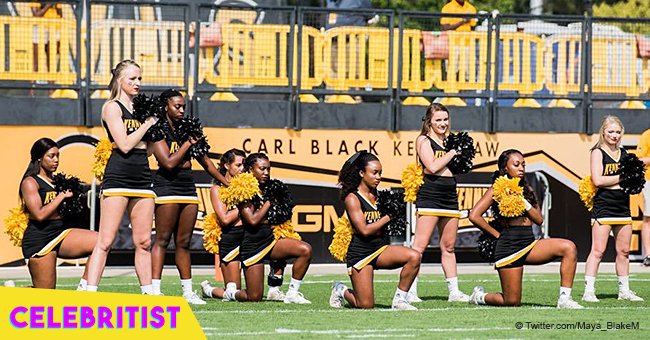
Ex-cheerleader who kneeled for national anthem sues officials after failing to make new squad
An ex-cheerleader has filed a lawsuit against her university and some officials accusing them of conspiring against her and four other cheerleaders who knelt in protest during the national anthem. The student claims their first amendment rights were violated when they were banned from the field during succeeding national anthem ceremonies following their protest.
A former Kennesaw State University cheerleader is suing her school and Georgia State officials for violating her first amendment rights.
In November, Tommia Dean and four other members of her cheerleading team knelt on the field during the singing of the national anthem in protest of police brutality and racial injustices. They were later banned from participating in succeeding national anthem ceremonies.
In response to what she deemed as a conspiracy, on September 5, Dean filed a federal lawsuit against her university president Samuel Olens, her school’s senior athletic directors Scott Whitlock and Matt Griffin, and Georgia officials Earl Ehrhart, a Georgia state representative, and Neil Warren, the Sherriff of Cobb County for “participating in a private conspiracy actionable under the Ku Klux Klan Act”, as stated in her lawsuit papers. Dean claimed the white Georgia officials targeted her and the four other cheerleaders who knelt with her because they were all African Americans protesting racism. She claimed that after they knelt in protest, the officials conspired with Olens to ensure that they would remain in their lockers during succeeding national anthems.
Following their protest last year, the five cheerleaders said their decision to kneel was planned and took weeks of prayer and discussion among themselves, with their parents and other cheerleaders. They felt they needed to express their stand against racism. One of the cheerleaders said,
“I feel as though it was nothing to disrespect America, which is why when we took the knee, we still made it a point to have our hands on our heart, but we just wanted to take the knee in the name of equality. That in a way is a love for this country, because we are using our freedom,”
Olens was not at the game at the time of the protest but was notified about it soon after. In Dean’s lawsuit, she claimed Olens was aware of KSU’s policy of protecting freedom of expression regardless of whether it goes against students and university employees’ personal views or not. Shortly after the kneeling incident, the University System of Georgia also advised him not to prohibit the cheerleaders from kneeling during the national anthem.
However, Olens’ stance changed when Ehrhart and Warren intervened and pressured him and the athletic department of KSU. Ehrhart is the chairman of the committee that assigns Georgia’s university budgets making him very influential. By October 4, Whitlock informed KSU officials that the cheerleaders would from then on be banned from staying on the field during the national anthem.
Both Warren and Ehrhart admitted they stopped the protest and Dean’s lawsuit has text messages between the two officials to prove it.
Due to pressure from students, faculty and the Board of Regents, Olens reversed his decision on November 8 and allowed the five cheerleaders back on the field during the national anthem. In February, he resigned after complaints were made regarding the way he handled the protest issue.
Meanwhile, Dean, who claimed she suffered migraine headaches and emotional stress, is demanding monetary compensation in her lawsuit. The amount was unspecified. She and three other cheerleaders who knelt last year are no longer part of the cheerleading squad this year because they were not selected to join.
While Ehrhart’s attorneys have issued a statement regarding their client’s innocence in charges referring to racial bias, Warren’s spokesperson has declined to comment pending litigation. The spokeswoman for KSU also opted not to comment while the case is ongoing.
